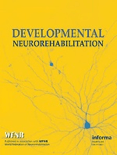
Developmental Neurorehabilitation
Scope & Guideline
Enhancing understanding of recovery in developmental disorders.
Introduction
Aims and Scopes
- Neurodevelopmental Disorders:
The journal primarily addresses issues related to neurodevelopmental disorders such as cerebral palsy, autism spectrum disorders, and developmental coordination disorders, emphasizing the need for improved assessment and intervention strategies. - Rehabilitation Techniques and Interventions:
A significant portion of the research focuses on innovative rehabilitation techniques, including physical therapy, occupational therapy, and telehealth interventions, aimed at enhancing functional outcomes for children with disabilities. - Cross-Cultural Studies and Adaptations:
The journal publishes studies that adapt tools and interventions across different cultural contexts, ensuring that methodologies are relevant and accessible to diverse populations. - Assessment Tools and Methodologies:
There is a consistent focus on developing and validating assessment tools that measure functional abilities, participation, and quality of life in children with disabilities, which are crucial for tailoring interventions. - Family and Caregiver Involvement:
Research often emphasizes the role of family dynamics and caregiver training in the rehabilitation process, highlighting the importance of involving families in therapeutic interventions.
Trending and Emerging
- Telehealth and Remote Interventions:
There is a growing trend towards researching telehealth and remote intervention strategies, particularly in light of the COVID-19 pandemic, as these methods offer flexibility and accessibility for families in need of rehabilitation services. - Participation and Quality of Life Assessments:
Recent publications increasingly focus on measuring participation in daily activities and quality of life for children with disabilities, highlighting the importance of these factors in evaluating the effectiveness of interventions. - Integrated Multidisciplinary Approaches:
Research emphasizing multidisciplinary approaches that combine various therapeutic disciplines (e.g., occupational therapy, physical therapy, and speech therapy) is on the rise, reflecting a holistic view of rehabilitation. - Parent and Caregiver Training Programs:
There is an emerging focus on developing and evaluating training programs aimed at equipping parents and caregivers with skills to support their children’s rehabilitation, recognizing their critical role in the process. - Use of Technology in Rehabilitation:
Innovative uses of technology, including virtual reality and gamification in therapy, are trending, as researchers explore how these tools can enhance engagement and outcomes in rehabilitation settings.
Declining or Waning
- Traditional Pharmacological Interventions:
There is a noticeable decrease in studies focusing solely on pharmacological treatments for neurodevelopmental disorders, as the journal increasingly favors non-invasive and rehabilitative approaches. - Generalized Motor Skills Assessments:
Research centered on generalized motor skills assessments without a specific focus on contextual factors or individualized approaches has diminished, as the field moves towards more tailored and specific evaluations. - Longitudinal Studies without Intervention Focus:
Longitudinal studies that merely track developmental progress without integrating intervention strategies are becoming less prevalent, as there is a growing emphasis on actionable research that directly informs clinical practice. - Focus on Adult Outcomes from Childhood Conditions:
There has been a decline in research specifically addressing adult outcomes of childhood neurodevelopmental conditions, as the journal's emphasis shifts towards immediate interventions and outcomes in pediatric populations. - Psychological Assessments without Rehabilitation Context:
Studies that assess psychological aspects in isolation from rehabilitation practices are less frequently published, indicating a shift towards integrated approaches that combine psychological and physical rehabilitation.
Similar Journals

Turkish Journal of Physiotherapy Rehabilitation-Turk Fizyoterapi ve Rehabilitasyon Dergisi
Unlocking the potential of rehabilitation therapies.The Turkish Journal of Physiotherapy Rehabilitation (Turk Fizyoterapi ve Rehabilitasyon Dergisi), published by the TURKEY ASSOC PHYSIOTHERAPISTS, stands as a significant platform for the dissemination of research and developments in the fields of physiotherapy, rehabilitation, orthopedics, and sports medicine. Since its inception in 2018, the journal has been dedicated to advancing the understanding and practice of rehabilitation therapies, contributing valuable insights to both clinicians and researchers alike. Currently classified in the Q4 category across various relevant fields, including Orthopedics, Sports Medicine, and Physical Therapy, it reflects the evolving landscape of rehabilitation science. Although the journal is indexed in Scopus with ranks indicating its nascent stage, it serves as an essential resource for the academic community in Turkey and beyond. Researchers and professionals interested in innovative rehabilitation practices and advancements are encouraged to utilize this open access journal to share knowledge, fostering collaboration and growth within this critical area of healthcare.
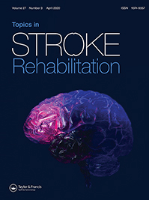
Topics in Stroke Rehabilitation
Leading the way in rehabilitation research.Topics in Stroke Rehabilitation, published by Taylor & Francis Ltd, stands as a premier academic journal offering cutting-edge research and insights in the fields of rehabilitation, neurology, and community care. With an impressive impact factor reflecting its strong scholarly influence, this journal not only maintains a distinguished Q1 ranking in Community and Home Care and Rehabilitation but is also recognized in the Q2 category for Clinical Neurology, showcasing its relevance across multiple disciplines. Covering a comprehensive range of topics from neurorehabilitation techniques to patient-centered care strategies, Topics in Stroke Rehabilitation serves as an essential resource for researchers, healthcare professionals, and students dedicated to enhancing the quality of life for individuals recovering from stroke. With an accessible archive dating back to 1996 and continuous publication through 2024, this journal invites collaboration and discourse, fostering advancements in both theoretical knowledge and practical applications within the realm of stroke rehabilitation.
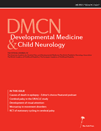
DEVELOPMENTAL MEDICINE AND CHILD NEUROLOGY
Connecting research to practice in child health and development.DEVELOPMENTAL MEDICINE AND CHILD NEUROLOGY, published by WILEY, is a premier journal dedicated to advancing knowledge in the fields of developmental neuroscience, clinical neurology, and pediatrics. With an impressive impact factor, this journal is recognized for its contributions, achieving Q1 ranking in both Pediatrics, Perinatology and Child Health, and Neurology (Clinical) sectors, as well as Q2 in Developmental Neuroscience. Since its inception in 1958, the journal has been at the forefront of disseminating vital research that informs clinical practice and enhances child health outcomes. Researchers and practitioners benefit from its high-quality, peer-reviewed articles that address critical issues in child neurology, underpinned by a robust Scopus ranking and a formidable percentile standing in relevant categories. While currently not an open-access journal, it remains a key resource for those dedicated to the study of child development, particularly at its intersection with neurological health. With a commitment to excellence, DEVELOPMENTAL MEDICINE AND CHILD NEUROLOGY is an essential read for anyone engaged in the care and research of pediatric populations.
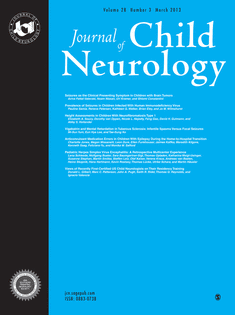
JOURNAL OF CHILD NEUROLOGY
Fostering Collaboration in the Study of Child Neurological DisordersThe JOURNAL OF CHILD NEUROLOGY is a distinguished publication in the critical fields of neurology and pediatrics, published by SAGE PUBLICATIONS INC. With its ISSN 0883-0738 and E-ISSN 1708-8283, this journal has been a pivotal resource since its inception in 1986, serving the needs of researchers, clinicians, and students dedicated to advancing the understanding and treatment of neurological disorders in children. As evidenced by its impressive Q2 rankings in both Neurology (clinical) and Pediatrics, Perinatology, and Child Health, the journal has established a reputable position within the academic community, ranking in the 75th percentile for pediatrics and the 53rd percentile for clinical neurology. This periodical not only contributes to the body of knowledge in child neurology but also promotes interdisciplinary collaboration, engaging a global audience through innovative research articles and case studies. Although the journal is not open access, it remains committed to disseminating high-quality research aimed at improving pediatric health outcomes, making it an essential read for professionals and researchers dedicated to this crucial area of medicine.

CoDAS
Innovating understanding in linguistics and auditory science.CoDAS, an esteemed academic journal published by the SOC BRASILEIRA FONOAUDIOLOGIA, serves as a leading platform for interdisciplinary research within the realms of linguistics, speech, and hearing sciences. Established as an Open Access journal in 2013, it ensures broad dissemination and accessibility of scholarly work, significantly benefitting researchers, clinicians, and students alike. Based in Brazil, CoDAS has garnered credibility with its impressive Q2 ranking in Linguistics and Language, as well as its rankings in Otorhinolaryngology and Speech and Hearing categories, reflecting its substantial contribution to these fields. The journal's impact is underscored by its robust Scopus rankings, including the 67th percentile in Language and Linguistics. With a commitment to fostering innovative research and bridging gaps between theory and practice, CoDAS continues to play a vital role in advancing knowledge and clinical practices in communication disorders and auditory sciences.

NEUROREHABILITATION AND NEURAL REPAIR
Advancing the Future of Neurorehabilitation.NEUROREHABILITATION AND NEURAL REPAIR, published by SAGE Publications Inc, is a leading journal in the fields of neurology and rehabilitation, addressing critical issues in neurorehabilitation across a broad spectrum of neurological disorders. With an impressive impact factor and consistently ranked in the Q1 category in both Neurology and Rehabilitation, this journal is esteemed for its rigorous peer-reviewed research contributing to advancements in clinical practice and rehabilitation strategies. The journal boasts an HIndex that reflects its global influence and is highly regarded among professionals and researchers, ranking in the top tiers of Scopus metrics across various categories. Since its inception in 1987, NEUROREHABILITATION AND NEURAL REPAIR has fostered innovative research aimed at improving outcomes for patients with neurological impairments, making it a crucial resource for those engaged in clinical research and therapeutic interventions. Explore this prestigious journal to stay at the forefront of developments in neurorehabilitation, with access options available for diverse readerships.

Turkish Journal of Physical Medicine and Rehabilitation
Bridging research and practice in physical medicine.Turkish Journal of Physical Medicine and Rehabilitation, an esteemed publication by BAYCINAR MEDICAL PUBL–BAYCINAR TIBBI YAYINCILIK, serves as a premier platform for the dissemination of cutting-edge research in the fields of physical therapy, sports therapy, and rehabilitation. Established in 2018, this open-access journal has rapidly ascended within the academic community, boasting a commendable Q2 ranking in both Physical Therapy, Sports Therapy and Rehabilitation and Rehabilitation categories for 2023. With a significant Scopus rank reflecting its competitive standing, researchers and practitioners can access vital findings that advance clinical practices and enhance patient outcomes. Located in Istanbul, Turkey, the journal not only emphasizes accessibility but also encourages contributions that address the evolving challenges in the realm of physical medicine. As it continues to grow, the journal aims to foster a collaborative research environment, engaging both established and emerging scholars in the exploration of innovative rehabilitation strategies and methodologies.

Current Developmental Disorders Reports
Connecting knowledge for better mental health outcomes.Current Developmental Disorders Reports, published by SPRINGERNATURE, is a crucial resource for researchers, practitioners, and students in the fields of developmental psychology, psychiatry, and neuroscience. Since its inception in 2014, this journal has aimed to disseminate cutting-edge research on the multifaceted nature of developmental disorders, providing valuable insights into causation, diagnosis, and intervention strategies. With an E-ISSN of 2196-2987 and a notable standing in the Q3 quartile across multiple fields—developmental and educational psychology, developmental neuroscience, and psychiatry and mental health—this journal holds a significant position in the academic landscape. Researchers contributing to the journal benefit from its open access policies, stimulating knowledge sharing and dialogue within the scientific community. The journal’s commitment to advancing understanding in these critical areas of study is reflected in its rigorous publication standards and diverse range of articles, making it an essential read for anyone invested in the developments in mental health and developmental disorders.
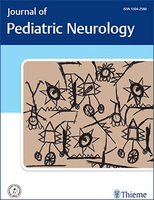
Journal of Pediatric Neurology
Navigating the complexities of childhood neurological disorders.Journal of Pediatric Neurology, published by GEORG THIEME VERLAG KG, stands as a dedicated resource in the field of pediatric neurology, navigating the complex interplay of neurological and developmental disorders affecting children. With its ISSN 1304-2580 and E-ISSN 1875-9041, this journal has been a pivotal platform for advancing research since its inception in 2003, and continues to present critical findings and discussions up to 2024. Although currently categorized in the Q4 quartile for both Neurology (Clinical) and Pediatrics, Perinatology and Child Health within Scopus rankings, the journal's commitment to fostering scholarly dialogue is essential for researchers, clinicians, and students dealing with pediatric patients. Its structured coverage of various neurological disorders, treatment strategies, and innovative therapies contributes to the broader understanding of pediatric neurology, despite the challenges noted in its ranking percentile. By encouraging submissions from diverse disciplines, the journal aims to enhance clinical practice and bridge gaps in knowledge, ensuring a multidisciplinary approach to child health and development.

Review Journal of Autism and Developmental Disorders
Connecting neuroscience and psychiatry for a brighter future.Review Journal of Autism and Developmental Disorders, published by Springer Heidelberg, stands as a leading platform for the dissemination of groundbreaking research in the realm of autism and developmental disorders. With an ISSN of 2195-7177 and an E-ISSN of 2195-7185, this journal not only showcases high-quality research but also emphasizes the crucial intersections between behavioral neuroscience, cognitive neuroscience, developmental neuroscience, and psychiatry. Notably, the journal has achieved a prestigious Q1 ranking across these categories, reflecting its impact and relevance; it ranks 10th in behavioral neuroscience and 5th in developmental neuroscience within Scopus metrics. Spanning from 2014 to 2024, the journal is dedicated to fostering a deeper understanding of autism spectrum disorders and related conditions, making it indispensable for researchers, clinicians, and students alike. While it operates under a traditional access model, the quality of the peer-reviewed articles ensures that it remains a valuable resource in the academic community.